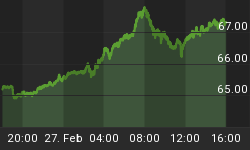I hate to be so critical of CNBC, especially since they were gracious enough to have me on as a guest on Monday, but when they present such an easy target, I just can't resist. Such was the case yesterday, when Larry Kudlow, host of "Kudlow & Co.," and one of that network's more colorful "economic" commentators, demonstrated his needs to return to Princeton for a refresher course in basic economics. I write this because, yesterday, when commenting on the release of disappointing first quarter GDP numbers, his ridiculous argument in favor of changing the way GDP is calculated, revealed a lack of understanding of what this basic economic statistic is attempting to measure.
Besides further supporting my stagflation warning (the deflator rose at an annual rate of 3.2%,) yesterday's report revealed that first quarter GDP grew at a less than stellar 3.1% rate; its slowest pace in two years, and well below Kudlow's typically far more optimistic forecast. But rather than admitting to being wrong, Kudlow, much like a golfer blaming a poor shot on a defective club, instead attributed the weaker performance to what he perceived to be a flaw in the methodology used to calculate the index. Since imports subtracted 2.19% from GDP, Kudlow proposed adding that value back in. In his words, "imports are not a bad thing" so why subtract them from GDP. As a result of his recalculation, Kudlow argued, with a straight face I might add, that the real growth rate of the U.S. GDP during the first quarter was in fact a far more robust 5.29%
While it may be true that imports per se are not bad, it is also true that they have absolutely nothing to do with GDP which is precisely why their value is subtracted from the calculation in the first place. The concept of GDP is to measure the value of goods and services produced by a nation. Since all goods and services produced are ultimately consumed, the index is calculated by totaling the expenditures made by individuals, corporations, and governments, (I + C + G). However, since goods produced for export are not consumed domestically, the value of exports is, therefore, added to GDP. If this adjustment were not made, the value of such production would go unmeasured. However, since expenditures on imports do not reflect domestic production, the value of imports is therefore subtracted from the calculation. The net result is GDP, or Gross Domestic Product.
So, contrary to Mr. Kudlow's claims, U.S. GDP was not reduced because Americans imported too much, it was reduced because we produced too little. By adding the value of imports back into GDP, what Kudlow, in fact, proposed measuring was something entirely different, perhaps a new indicator which more accurately might be called GDC, or Gross Domestic Consumption. While such a ridiculous concept may in fact seem appropriate given the current state of the highly imbalanced U.S. economy, it should not be confused with GDP, which at least attempts to measure the value of what a nation produces, not what it consumes.
I do agree with Mr. Kudlow on one point. This GDP report does in fact present a distorted measure of the real output of the U.S. economy. By failing to capture the true rate of inflation, the deflator results in GDP being considerably higher than would otherwise be the case were a more honest measure of inflation used. Also, as GDP includes goods and services which do not necessarily reflect higher standards of living, such as excessive legal or medical expenditures, increased outlays necessary to deter rising criminal or terrorist threats, or mere restoration of property damaged by natural disaster, it often exaggerates true economic growth.
In a world where government officials routinely change the way economic statistics are calculated, for the specific purpose of engineering a false sense of prosperity, Kudlow's suggestion seems par for the course. However, such a biased manipulation would be far more "appropriate" were Kudlow still working on the federal payroll, where such propaganda would at least be expected, rather than as a supposedly objective commentator, where unsuspecting viewers might confuse his economic cheerleading with legitimate insight, to the detriment of their financial well being.















